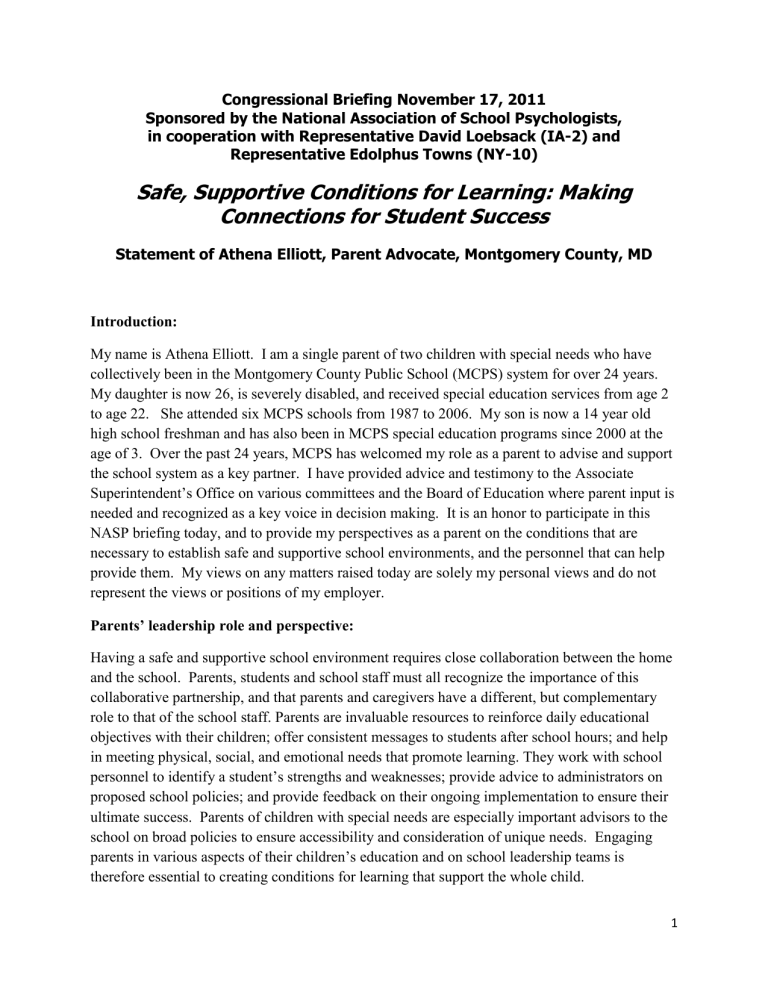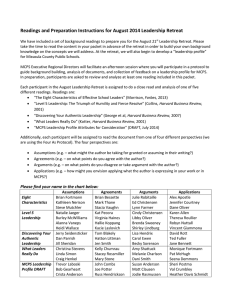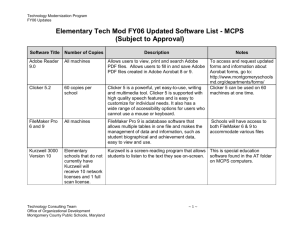Congressional Briefing November 17, 2011

Congressional Briefing November 17, 2011
Sponsored by the National Association of School Psychologists, in cooperation with Representative David Loebsack (IA-2) and
Representative Edolphus Towns (NY-10)
Safe, Supportive Conditions for Learning: Making
Connections for Student Success
Statement of Athena Elliott, Parent Advocate, Montgomery County, MD
Introduction:
My name is Athena Elliott. I am a single parent of two children with special needs who have collectively been in the Montgomery County Public School (MCPS) system for over 24 years.
My daughter is now 26, is severely disabled, and received special education services from age 2 to age 22. She attended six MCPS schools from 1987 to 2006. My son is now a 14 year old high school freshman and has also been in MCPS special education programs since 2000 at the age of 3. Over the past 24 years, MCPS has welcomed my role as a parent to advise and support the school system as a key partner. I have provided advice and testimony to the Associate
Superintendent’s Office on various committees and the Board of Education where parent input is needed and recognized as a key voice in decision making. It is an honor to participate in this
NASP briefing today, and to provide my perspectives as a parent on the conditions that are necessary to establish safe and supportive school environments, and the personnel that can help provide them. My views on any matters raised today are solely my personal views and do not represent the views or positions of my employer.
Parents’ leadership role and perspective:
Having a safe and supportive school environment requires close collaboration between the home and the school. Parents, students and school staff must all recognize the importance of this collaborative partnership, and that parents and caregivers have a different, but complementary role to that of the school staff. Parents are invaluable resources to reinforce daily educational objectives with their children; offer consistent messages to students after school hours; and help in meeting physical, social, and emotional needs that promote learning. They work with school personnel to identify a student’s strengths and weaknesses; provide advice to administrators on proposed school policies; and provide feedback on their ongoing implementation to ensure their ultimate success. Parents of children with special needs are especially important advisors to the school on broad policies to ensure accessibility and consideration of unique needs. Engaging parents in various aspects of their children’s education and on school leadership teams is therefore essential to creating conditions for learning that support the whole child.
1
In 2004 I was one of six parents appointed by the Board of Education to participate on a multidisciplinary committee called the Special Education Continuous Improvement Advisory
Committee. This committee was charged in part with identifying measurable indicators, desired outcomes, and key performance benchmarks of special education program equity and effectiveness. One of the issues being addressed was "disproportionality." This issue was of concern to the district because certain minority groups were overrepresented in special education when compared to the general population. System-wide and school-level data informed the work of the committee.
I advocated for a policy that would require schools to review data each year on the numbers and trends of students receiving special education services by race, and strongly opposed allowing
“quotas” to be established as a measure of success. I also argued that more emphasis should be placed on providing the necessary resources and personnel to meet the myriad social, emotional, and academic needs of all students. Such efforts require sound data to be utilized to identify and address barriers to learning. Qualified personnel are necessary to help collect, interpret, and use these data for planning and monitoring interventions that make schools safe and supportive and meet individual student needs. As such, I recommended an increase in the number of school psychologists and other specialized instructional support personnel. This recognition of mental health needs as an integral part of the education process has resulted in an improvement in quality and effectiveness of services to all students. As for my son, during each transition to middle and high school, the data collected by the mental health professionals in the school made the difference in setting up the best system of interventions and supports and creating an optimal school environment.
Importance of school-based mental health services:
I have seen how both physical and mental health and wellness contribute to academic success.
While my daughter’s physical needs were more profound, my son’s social and emotional health issues created a barrier to learning – and I believe that the valuable resources, ongoing homeschool collaboration, and support of school-based specialized instructional support personnel helped lead to positive outcomes for my son.
An example of an intervention to improve connectedness that was successful in my son’s middle school years, and is also needed now in his transition to high school, is an active “buddy system” with trusted, caring staff member in the building. In middle school, my son was very sensitive to feeling awkward and shy and would hesitate to express his needs if he was getting “lost in the shuffle” in his general education classes. The team, which included educators and other support personnel, recommended one caring adult that he related to well, who would provide a daily personal “check in” and be a resource to discuss any concerns he had with students, teachers or any classroom or social difficulties. This check-in time was best done for a few minutes at the end of the day or at lunch. It usually occurred three or four days a week, and provided a safe zone for my son, and a listening ear who could refer any needed follow up to the appropriate
2
staff, or just provide a confidential brief counseling session for him de-stress and transition to after school care and homework. Usually just talking to a person with some authority in the school, and knowing someone in the system cared for him and listened, was a good motivator.
This type of one-on-one support is needed now in his first year in high school; if not every day, then at least a couple of times per week. Establishing connectedness one person at a time is an important principle for students who struggle with social confidence.
I have observed that when my son feels accepted by his peers, cared for and supported by school staff, and is placed in situations where he is likely to succeed, he flourishes. Providing these conditions for learning require a coordinated, comprehensive, and integrated approach that includes the efforts of teachers, administrators, parents, students, and school-employed specialized instructional support personnel such as school psychologists, school counselors, school social workers, and school nurses. Without these components in place, we are setting our students up for failure. My years as a parent have taught me that my children’s ability to learn, succeed, and be happy are contingent upon positive conditions for learning. In meeting the public need, it is important for school systems to develop policies and programs that establish an environment where students feel safe and supported and that families have the opportunity for meaningful engagement in the educational process.
3











